Yves here. As much as readers may already have an intuitive grasp of the story told in this post, data can help define its contours better. Here we see that the rising tide of global growth has not lifted all boats. The gains of the once-poor in China and India have come at the expense of the what used to be the middle class in more developed countries. Reducing poverty has not been a zero sum game. This post also omits another key piece: the rise and rise of an uber-wealthy class.
By Leith van Onselen who has previously worked at the Australian Treasury, Victorian Treasury and Goldman Sachs. You can follow him on Twitter at twitter.com/leithvo. Originally published at MacroBusiness
The Economist has published a neat new chart showing the extent of global wealth inequality, drawing on data from Credit Suisse’s latest global wealth report:
According to The Economist:
GLOBAL wealth has increased from $117 trillion in 2000 to $262 trillion this year. That comes to $56,000 for each adult on earth. But the fortune is far from evenly distributed… Today 94.5% of the world’s household wealth is held by 20% of the adult population…
Wealth is so unevenly distributed, that you need just $3,650 (less debts) to count yourself among the richest half of the world’s population. A mere $77,000 brings you among the wealthiest 10%. And just $798,000 puts you into the ranks of the 1%…
Taking a global perspective, the data is more encouraging, with recent research from World Bank researchers, Christoph Lakner and Milanovic Branko, arguing that there has been an overall reduction in poverty via a redistribution of wealth from richer to poorer countries, which has been achieved through greater inequality within rich nations (i.e. a transfer from the poor and middle classes to rich plutocrats). From VOX:
A ‘quasi non-anonymous’ growth incidence curve in Figure 2… shows how the country/deciles that were poor, middle-class, rich, etc. in 1988 performed over the next 20 years…
People around the median almost doubled their real incomes. Not surprisingly, 9 out of 10 such ‘winners’ were from the ‘resurgent Asia’. For example, a person around the middle of the Chinese urban income distribution saw his or her 1988 real income multiplied by a factor of almost 3; someone in the middle of the Indonesian or Thai income distribution by a factor of 2, Indian by a factor of 1.4, etc.
It is perhaps less expected that people who gained the least were almost entirely from the ‘mature economies’ – OECD members that include also a number of former communist countries. But even when the latter are excluded, the overwhelming majority in that group of ‘losers’ are from the ‘old, conventional’ rich world. But not just anyone from the rich world. Rather, the ‘losers’ were predominantly the people who in their countries belong to the lower halves of national income distributions. Those around the median of the German income distribution have gained only 7% in real terms over 20 years; those in the US, 26%. Those in Japan lost out in real terms…
The striking association of large gains around the median of the global income distribution – received mostly by the Asian populations – and the stagnation of incomes among the poor or lower middle classes in rich countries, naturally opens the question of whether the two are associated…
While the real income of the US 2nd decile has increased by some 20% in a quarter century, the income of China’s 8th decile has been multiplied by a factor of 6.5. The absolute income gap, still significant five years ago, before the onset of the Great Recession, has narrowed substantially.
…if we take a simplistic, but effective, view that democracy is correlated with a large and vibrant middle class, its continued hollowing-out in the rich world would, combined with growth of incomes at the top, imply a movement away from democracy and towards forms of plutocracy.
An updated paper by the World Bank, released last week, also found that global poverty has improved significantly since 1990, whereby “the number of people living in extreme poverty has halved, to around one billion people, or 14.5 percent of the world’s population”. Again, the key drivers of these gains since 1990 are the rise of China and India, which together account for around one third of the global population.
Overall, one’s views on whether inequality and poverty is worsening probably depends upon where one lives. The rapid growth in Asia that has lifted billions out of poverty has been a remarkable achievement. However, this has been achieved, in part, at the expense of lower-to-middle income earners in the developed world, where the middle classes have been hollowed-out.
The World Bank’s argument about the hollowing-out of the middle class in advanced economies, implying a movement away from democracy towards plutocracy, is also supported by a report published earlier this year from Oxfam. Oxfam found that the richest 1% increased their share of income in 24 out of 26 countries for which data was available between 1980 and 2012, with the wealthiest 1% in the US capturing 95% of post-financial crisis growth since 2009, whereas the bottom 90% became poorer (see below charts).
Oxfam also warned that the increasing concentration of economic resources in the hands of fewer people (the “plutocrats”) presents a major threat to political and economic systems. In particular, people are becoming increasingly separated by economic and political power, leading to heightened social tensions and increasing the risk of societal breakdown. Laws are also increasingly favouring the rich, driven by a “power grab” by wealthy elites, who have co-opted the political process to rig the rules of the economic system in their favour.
Unfortunately for those living in rich nations, inequality is likely to worsen before it gets better, as improvements in technology and robotics places at risk a large number of skilled jobs, hollowing-out the middle class even further and increasing returns to owners of capital at the expense of labour.
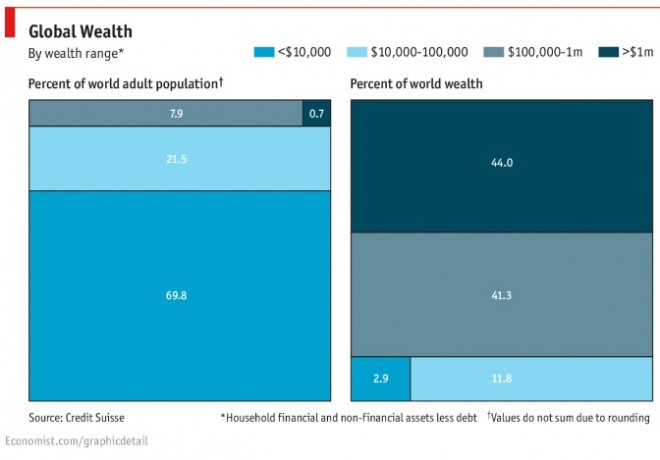
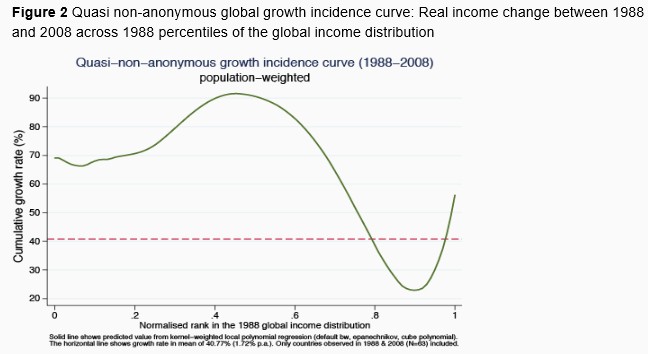
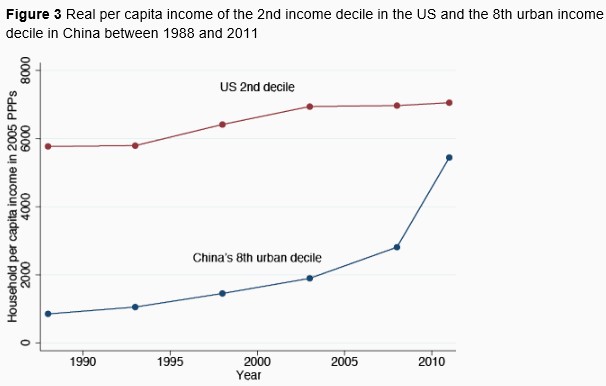
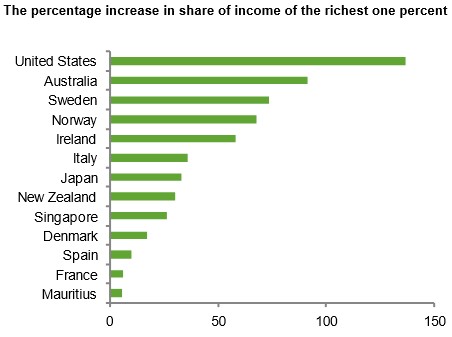
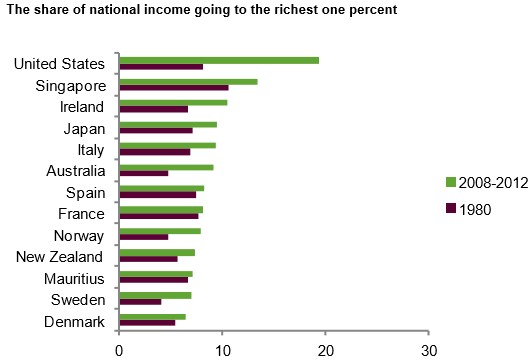


There’s another nuance I’d like to add (and I absolutely would say that it’s no grounds for sympathy, that’s not what I am driving at here) which is that even if you’re like me who may just scrape in that tiny 0.7% dark blue square, you definitely do not feel “safe” or “secure” in our society today. So if I don’t (eager as always to hear others’ views even if contradictory) at what level do you ? 0.1% ? 0.01% ?
As Yves mentioned yesterday in connection witht Ebola, in truth if society is regressing via jalopified institutions, no-one can be said to be truly out of the woods…
If safety is the question, I’m not sure any bracket ever feels safe; in fact, there may be a weak inverse correlation. I say this, because the richest persons I know and those most often reported on in the media live remarkably miserly lifestyles. In a word, they hoard. You don’t hoard resources or objects, if you feel a fundamental sense of ease about their being there when you need them. I think this is one area where the Buddhists have it right: attachment to stuff is likely to lead to suffering… well, spiritual suffering, at least.
I agree. The (admittedly tiny, tiny handful and hardly a representative sample of) very wealthy people I know seem to be in constant fear of “losing it all”. The more they have, the greater the fear of loss that appears to set in.
The marginal propensity to consume is obviously much lower for a person of wealth. To look at it hypothetically, a poor household with an income of $10,000 will have a MPC of close to 100%. While someone with $1m may be around 40%. Of course the wealthy will put some of it in saving, but a good portion will be looking for a return (investing). Investing, and risk taking should help the poor and middle class by ultimately creating jobs.
The argument that the rich are unhappy because of the “burdens of wealth” is a load of crap. After about 70K happiness researchers found extra wealth doesn’t increase happiness, but it doesn’t hurt it either. People tell themselves this lie to feel better, but it hurts arguments for economic justice.
What is your definition of “economic justice”?
You can’t buy safety or peace-of-mind with money (Cf. French Revolution, Russian Revolution, etc.). If you’re concerned about your personal well-being, despite having over a $1 million in wealth, you need to concern yourself less with your finances and more with your relationships. The best that financial wealth has ever been able to offer is a false sense of security. If you want real security, I suggest making lots of friends…also, try about 5 dried grams of psilocybe cubensis in a nice, peaceful setting. All your worries (and everything else) will just sort of melt away….
Oh, I have a nice circle of friends and family. But I worry about them too ! I worry about my mother-in-law’s cat. And she sometimes gives me a scratch just for tickling her behind the ears. (the cat, not the mother-in-law).
Actually… I even worry about people I don’t particularly like. It’s probably a currently undiscovered disease which only affects British middle aged people. Maybe a really should simply wait for big pharma to come up with a pill-a-day for it. At least there’d be some money in it for them, unlike Ebola.
Your wish is big pharma’s command: Klonopin, Valium, Xanax … there’s a host of em! Some have even gone generic!
(Not that I would prescribe that solution.)
Go visit a “third-world” country, hang out with the locals, and come to the realization that, come what may, you would figure something out. It’s only because we’ve grown accustomed to our current way of life and its conveniences that we think we can’t live with out them. But we can, and we might be forced to. Don’t worry though, it won’t be nearly so horrible as you think. You’d be amazed at what you can do, and even enjoy, when you don’t have a choice.
“Man is a creature that can get used to anything, and I think that is the best definition of him.” — Dostoyevsky
I am doing “ok” myself, but I also feel insecure. Well who wouldn’t? Even for those us who, through whatever means, have managed to put aside a nest egg, plus in my own case, allegedly I have a pension, there’s absolutely NO guarantee that ANY of it will be available to me or my family in the long run.
I don’t remember the final outcome in Cyprus, so I can’t remember if the 1% stole from citizens’ bank accounts. But that was certainly “on the table” there. So Cypriots worked hard (one assumes) and saved their pennies, and then the crash happens due to shenanigans by the 1%, and Cypriots are told that their life savings will simply be stolen. Sucks to be you.
Frankly the 2008 crash did result in me losing ground in my portfolio. Lucky for me, I got off not too badly, but still: I feel that I was definitely ripped off. I mean, those who f*cked the system got “bailed out” to the tune of trillions by ME. What did I get? A very very tiny tax write-off. The end. Sucks to be me.
Insecurity R Us, I guess. What do I do? Someone mentioned Buddhism, above, discussing non-attachment. Frankly that’s what I do – practice non-attachment and in my better days, attempt to witness this insane clusterf*ck as a lesson to be learned. About the only thing I can come up with, along with spending time in the great outdoors. Open to other suggestions.
A direct consequence of higher inequality is underconsumptiom followed by reduced investment, higher savings, imbalances, debt, unemployment and volatility.
3,650 to be in richest half of the world’s population.
Upon reading this, I immediately checked my account. Imagine my delight! $3,823!
I am Rich! Lucky to be an American and rich! Wow! I feel much better now (though, “A mere $77,000″….I’d love that “mere”).
Combined with American Exceptionalism, this could be useful for the plutocrats in our country (quit complaining, you serfs!)
And, re “billions [lifted] out of poverty…in part, at the expense of lower-to-middle income earners in the developed world.”
So, the lower-to-middle income earners in the developed world working hard at developing consumers for the the wealthiest?”
“I think she’s got it! By George, she’s got it!”
You rich $#%@! [sarc]
I was actually pleased to find myself not making that cut (not by a long-shot). Now I don’t have to feel like a hypocrite when I bitch about wealth inequality…no wonder I feel so at home in the “third world”–dem’s my peeps!
hello, peeps. how you doin?
Excellente! Thankfully I have no mouth but my own to feed, so it’s not bad at all. It’s very possible to live off the waste of the empire quite comfortably, if you can find a steady source of minimal income to fill in the gaps. Others, alas, are not so unencumbered as I…for those of my peeps, I worry…
yes, but that balance was there ONLY because- just paid, and rent and bills all due, and little by little I’ve been saving for the extortion ‘er dental work I have long needed… so just rich for a week. I’ll celebrate with dark chocolate.
I think that means you are at or slightly above the 50% percentile. Most people wouldn’t classify someone like that as “rich”.
“Hooray! 3.25 billion people have more wealth than me!” has a different ring to it.
“Unfortunately for those living in rich nations, inequality is likely to worsen before it gets better, as improvements in technology and robotics places at risk a large number of skilled jobs, hollowing-out the middle class even further and increasing returns to owners of capital at the expense of labour“.
Leading to the conclusion that capital should be redistributed in rich nations? After all, what does it matter who owns the common stock of large US corporations to their day-to-day operations? If not to improve those operations via, for example, less alienated workers?
So a redistribution of capital is a win-win; we get to keep the productiveness of capitalism while spreading the profits roughly equally.
This solution is also just given that those corporations (and the infrastructure that supports them) were largely built by slaves, both chattel and debt and wage slaves.
So the solution is not large scale socialism but ethical capitalism.
Just try redistributing capital in any country without a hefty redistribution of blood (what is actually required for social change). You won’t get very far with your demands (look at how meager Occupy’s were and the disproportionate police response) without them breaking you.
Blood will pour in the streets and heads will roll.
It’ll happen. It always does when the government has gone looney and fails to feed people.
Redistribution of capital is the only option at this point. It will, therefore, happen. The question is what happens afterwards — we could just get a new elite.
The rapid growth in Asia that has lifted billions out of poverty has been a remarkable achievement. However, this has been achieved,
in partalmost entirely, at the expense of lower-to-middle income earners in the developed world, where the middle classes have been hollowed-out.Truer now. What is missing in this post are the external unrecognized expense of a grossly polluted China, something studiously ignored by all globalization proponents. Centuries of clean up ahead, and not a penny of it accounted for. Great comfort to China’s 8th urban decile whose pay increase from a few pennies per day to a few more pennies per day should surely cover this.
Meanwhile China’s leaders are getting out as fast as they can, snapping up properties in Vancouver, San Francisco and elsewhere with the “stolen purchasing power” of that 8th urban decile and whomever else they can steal it from. That is, after Walmart and Apple are through with having their way with them.
It is not true that “billions have been lifted out of poverty”. What has happened is that many people now earn more than $2.00 per day, so they are no longer classified by economists as being poor. They are “middle class” (this has been recently discussed here at NC). For an example of an economist spouting foolishness, see:
http://www.adb.org/publications/middle-class-size-past-present-and-future-description-trends-asia
“This paper describes the size of the middle class in developing Asia across countries and over time. Based on an absolute measure of the middle class of $2-$20 (2005 purchasing power parity United States dollars), it finds that between 1990 and 2008, the size of the middle class in developing Asia has grown dramatically in percentage share, absolute size, and purchasing power.”
Here’s an article in which the author protests against overly inclusive measures of the middle class:
http://www.cgdev.org/blog/who-you-callin’-middle-class-plea-development-community
I apologize for repeating something that I said only two weeks ago, but the myth of a large Third World middle class is very persistent, and it will take a lot of effort to correct this misapprehension.
However, it is true that most of the gains in the Third World have been made at the expense of lower and middle income people in the wealthier nations. And Chinese pollution is spectacularly bad.
agree. the “billions lifted out of poverty,” etc, are repeated and repeated…till “fact.” thanks.
Unlike Capitalism, Globalization is Zero-sum and a giant Ponzi/Pyramid/Caste system. Govt Must Tax Corporate Revenues (not their Profits).
http://news.yahoo.com/warren-buffett-secretary-talk-taxes-221442297–abc-news.html
https://en.wikipedia.org/wiki/High_beta_fusion_reactor will change world economy
It’s true, in part, that the improvement in financial status of some across the global – mainly China and India – has come at the expense of the working class and middle class in what used to be called the “first” world. But that’s not the whole picture, of course. The post does address this, but – economics dummy that I may be – there’s another factor, which is how the 1% globally has rigged and gamed the system to the extent that they are ensuring they get the lion’s share of the wealth. Their rent-seeking has also led to great losses for the working and middle classes in the “first” world countries. IOW, it’s not just that poorer people in India and China got wealthier, so that somehow “screwed” the middle classes in developed nations. I posit that a bigger piece of the pie was stolen by the wealthy. I could be wrong, but it’s certainly a strong factor.
There are loads of arguments about why it simply wouldn’t “work” to tax the mega-wealthy, and how that wouldn’t make any difference blah blah blah… Economics dumbo that I am, I don’t buy that.
However, we are at some kind of weird ugly place where it appears to impossible for any valid changes to made “within the system.” I don’t what the tipping point will look like. Probably not pretty.
“However, this has been achieved, in part, at the expense of lower-to-middle income earners in the developed world, where the middle classes have been hollowed-out.”
Um, that’s not at all what the data suggests. The middle classes have been hollowed out by the upper classes – primarily the upper classes in their own industrialized nations – not working classes in industrializing nations.
But, it’s much more fun to blame the poor. Just as the 1% like to blame the middle class for not having the “right skills.”
That’s how I see it. The rising wages/std of living in third world nations may contribute somewhat to the lowering of wages and std of living for those in the working/middle classes in first world nations. But I fail to see that as the main driving factor. It’s more about the rent-seeking and other rip offs and game-rigging by the 1%, who have shifted insane amounts of wealth to themselves, whilst ensuring deprivation for nearly everyone else (and then, of course, *blaming* it on those that the 1% has just ripped off).
Article/post seems imbalanced to me, but perhaps I’m mis-reading it.
This is a second canard that bears no evidence in the data:
“Unfortunately for those living in rich nations, inequality is likely to worsen before it gets better, as improvements in technology and robotics places at risk a large number of skilled jobs, hollowing-out the middle class even further and increasing returns to owners of capital at the expense of labour.”
Technology, robotics, ‘skills’, etc., have nothing to do with inequality. It’s public policy that decides compensation and taxation and so forth, not computers. I challenge the author to even define what a skilled job is, let alone connect it to inequality.
Technology, robotics, ‘skills’, etc., have nothing to do with inequality. It’s public policy that decides compensation washunate
What if technology has eliminated your job? Then what good is a raise in minimum wage, for instance, to you?
That said, foreign workers are not to blame. Rather the grossly unequal ownership of assets in rich countries is.
Technology and robots are not to blame either.
Our money system is based on usury and theft of purchasing power, especially from the poor since they are the least so-called creditworthy and lo and behold: Inequality has increased!
A century and a half ago the majority of the American workforce had a job in agriculture. Are you saying we’re worse off because we’ve lost all those jobs?
considering what corporate, mass ag-farming is and does, yes.
Ah, what does the rise of industrial agriculture have to do with the decrease in the number of labor hours required to feed ourselves?
It is precisely that link I would dispute, that false choice presented by the authoritarians, that the only two options are either to live in the stone age, so to speak, or accept concentrated wealth and power as a necessary and unavoidable outcome of modern technology.
The technology argument is about making it appear that inequality is a natural outcome rather than one manufactured by public policy.
It is precisely that link I would dispute, that false choice presented by the authoritarians, that the only two options are either to live in the stone age, so to speak, or accept concentrated wealth and power as a necessary and unavoidable outcome of modern technology. washunate
Yep. It’s a false choice since the operations of large corporations, include corporate farms, would not necessarily be adversely affected if they were equally owned.
“The technology argument is about making it appear that inequality is a natural outcome rather than one manufactured by public policy.”
ITA.
Our society is as unequal as it is because we have chosen that it be.
Not the jobs* necessarily but ownership of the land. That’s been a huge loss.
But even if economies of scale dictate we should not go back to family farms, at least the agricultural land should be equally owned by all citizens.
*However, farming is a breeze today, compared to then, I’d bet, and has been since modern equipment including air-conditioned tractors with 8-track players.
Yeoman farmers in England before the Industrial Revolution who had access to common pastureland and could hunt supported themselves and had lots of leisure time.
And my ancestors on my father’s side of the family in the 18th century, who were farmers and fishermen in Maine, all lived into their 80s and 90s. Both church records and gravestones confirm the lifespans. So these weren’t bad lives to live.
Today’s economy is based around Hamburgers, casino’s , Lotteries, leisure, sports and Hollywood. Wall Street is a casino where you might look good on paper but if the top 1% wanted to cash out the other 99% would be bag holders. Where is the Value in going to a Tractor pull where the Tractor has 3 or 4 turbo charged engine’s to drag a sled 200 hundred feet across the turf. Where is the value of eating 200 million hamburgers a day in the USA if they are just crap the next morning. Why does a sport’s Jock make 200 million and a good old fashion hard working American who is building something gets the boot just because. I have a garage full of shit that I bought in the good times. I have been going through it using stuff I thought was old or out dated. Found a 20 dollar bill in a shirt pocket that I boxed up 15 years ago. To hell with Wal-mart and the big box store.
Somewhat surprised to find myself amongst the 1% as I’m not aware that I’ve ever conspired to deprive anyone of their just dues.
In fact I’d suggest the reason I am two years from retirement age in a financially comfortable position is that I chose not to have children and instead accumulated most of the money my peers spent bringing up their sprogs. Hence now I am in my 60’s and wealthy while they are entering retirement lucky to be free of debt but with the riches of children and grandchildren to enjoy.
I wouldn’t call myself wealthy, but I am – at least on paper – comfortably set up. Like you, I have no kids, plus I’ve been reasonably frugal. It’s easier to save under such conditions. My friends with kids are definitely finding it more difficult to save, etc. Pros and cons to either way.
I may not have my own “sprogs,” but I do have extended family. these days, I feel the need to assist wherever I can. It’s struggle for many.
This data goes a long way to explain why loony xenophobic “populist” political parties have been gaining ground in Scandinavian countries over the past couple of decades, now at a much faster pace – inequality is rising, hurting the average person and their govts have been cutting the social safety net from what it used to be.
Unfortunately these Scandinavian people latching on to xenophobia are too dim to grasp that their own elites are running off with the money. I mean somebody is getting VERY rich in the mean time – and it’s certainly NOT the immigrants!